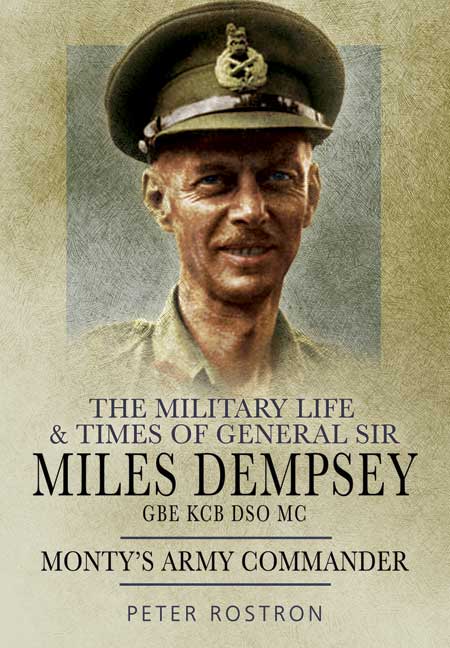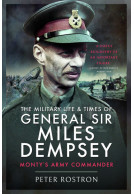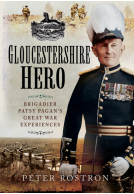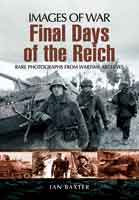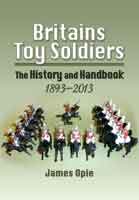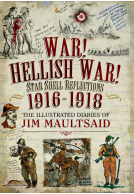The Military Life and Times of General Sir Miles Dempsey (ePub)
Monty's Army Commander
Imprint: Pen & Sword Military
File Size: 5.0 MB (.epub)
Pages: 240
Illustrations: 16pp B & W plates
ISBN: 9781844684885
Published: 5th May 2010
| Other formats available | Price |
|---|---|
| The Military Life and Times of… Paperback Add to Basket | £14.99 |
Miles Dempsey, Commander of the British Second Army in the invasion of Europe 1944-45, is almost unknown to the general public. Yet his part in Britain's contribution to that campaign was second only to Montgomery's in importance.
Dempsey survived two and a half years of bitter fighting as an infantry officer on the Western Front before accompanying his beloved Royal Berkshire Regiment in the little-known North West Persia campaign of 1920-21. In six years he rose from Major to command over half a million men in the largest combined operation in history, and led them to victory a year later.
Based on sources which include some of Dempsey's previously unpublished work and the views of those who knew him, the book traces his career as a soldier of rare distinction, a talented sportsman and a man of huge charm and shrewd intellect, dedicated to his beloved regiment and ever mindful of the lives of his soldiers. It examines his methods of command and his relationships with Montgomery, his Corps commanders, the Americans and the RAF. It highlights his crucial role in the Dunkirk evacuation, the training of the Canadian Army, and the invasion of Sicily, Italy, and North West Europe. It analyses why his army performed so brilliantly on D Day, and examines his contribution to the campaign in Europe, focussing on the controversial operations of Epsom, Goodwood, Arnhem and the Rhine Crossing.
Peter Rostron is a former soldier who served with the Gloucestershire Regiment. He is an International Fellow of the United States Army War College.
As featured in
Gun Mart Magazine
"The biography is profound, and, from page one to the book’s last, vividly presented as all solid, honest, intelligent reportage should be."
ARGunners.com
Read the review here
This book is very well-written, balancing the details of operations with placing Dempsey in context and emphasizes his careful and methodical approach to planning and loyalty subordinates and seniors - although he was not averse to dismissing commanders in the field if they under-performed. One sense that after the war, despite command in the Middle East during the insurgency in Palestine (where Monty's political wrangling in London could have proven disastrous) Dempsey was tired - and decided to retire despite the urging of loyal subordinates.
SOFNAM Newsletter Spring 2011
This is a deeply sympathetic study of an overlooked officer and fills a considerable gap in the literature.
The first full biography of Dempsey may seem surprising, if only because the commander of the British Army in the European campaign 1944-45 might be expected to have attracted more attention. Previous attempts have indeed been made but all foundered on the central problem of lack of primary sources. Dempsey having ordered most of his papers detroyed on his death. The current author uniquely had access to family papers but whether they add significantly to the story is open to question. The cited entries form his WW1 diaries are cryptic and those from his letters home are vague, not to say banal, becoming more substantial only when contemplating his post-Army future.
Military History Society, Nov 2010
In pursuit of Dempsey's character much use has been made of the Royal Berkshire Regimental journal, "China Dragon". Unlikely to be an impartial witness anyway, the value of these references has been further vitiated by not quoting the year of publication. This makes it impossible to assess in most cases whether the comments are valedictory, in which case one might reasonably expect not to see any comment less than laudable. Judgements on the man are therefore greatly reliant on inferences. Rather more substantial "professional material" comes from exchanges between himself and Pyman and Leese. Here he criticises the Far East Command structure towards the end of the war and later expresses reservations about the running of the higher command in peace, but all the while showing a marked disinclination to express his views publicly. Similarly useful are his comments to historians Molony, author of the Mediterranean Official History, and Lewin, where he is shown to be careful of reputations. Sadly, one will look in vain for substantive clues anywhere to one of the great puzzles of the European campaign, how the relationship and command structure worked between himself and Montgomery.
The dearth of clues to the man obliges the author to fall back on depicting the circumstances in which his subject operated. The result is a more than competent description of the campaigns in which Dempsey took part. If there is an overall failing it is that the author is too uncritical of his subject and seems happy to take him at face value. While this is a well-crafted book that maximises scant resources, the whole is inevitably Hamlet without the prince.
Miles Dempsey, Commander of the British Second Army in the invasion of Europe 1944-45, is almost unknown to the general public. Yet his part of in Britain's contribution to that campaign was second only to Montgomery's in importance. Dempsey survived two and a half years of bitter fighting as an infantry officer on the Western Front before accompanying his beloved Royal Berkshire Regiment in the little-known North West Persia campaign of 1920-21. In six years he rose from Major to command over half a million men in the largest combined operation in history, and led them to victory a year later. Based on sources which include some of Dempsey's previous unpublished work and the views of those who know him, the book traces his career as a soldier of rare distinction, a talented sportsman and a man of huge charm and shrewd intellect dedicated to his beloved regiment and ever mindful of the lives of his soldiers. It examines his methods of command and his relationships with Montgomery, his Corps commanders, the Americans and the RAF. It highlights his crucial role in the Dunkirk evacuation, the training of the Canadian Army, and the invasion of Sicily, Italy and North West Europe. It analyses why his army performed so brilliantly on D Day, and examines his contribution to the campaign in Europe.
Spartacus Review
General Sir Miles Dempsey is perhaps the least-well known senior British commander of the Second World War, familiar to many by name, but otherwise an unknown figure, overshadowed by his close association with Field Marshal Montgomery. This despite and the anti-invasion preparations that followed, before moving to North Africa to take command of a corps during the invasion of Sicily and southern Italy.
History of War Website, August 2010
He then moved to command the British Second Army, half of the Allied force that landed in France on D-Day. He was then involved in most of the famous British battles in Normandy, including Epsom and Goodwood, before leading his army during the breakout from Normandy, the advance across France, the ground-based part of the battle of Arnhem and the Rhine crossing in 1945. Before that he had fought on the Western Front from 1916 until the end of the war, taking part in the second part of the battle of the Somme.
Dempsey is obscure in a rather unusual way, in that anyone who has read about the campaign in northern-western Europe in 1944/45 will be very familiar with his name, and the achievements of his army, but many (myself included) will know very little about the man himself. This obscurity can be blamed on a variety of causes. His own modesty, dislike of publicity and refusal to write memoirs undoubtedly play a major part in it. His decision to retire soon after the end of the war, thus missing a chance to become Chief of the General Staff, the professional head of the British Army, probably didn't help. The nature of his career also played a part, in that he didn't hold any important independent commands during the war, instead spending much of his time serving under Monty.
Much military history focuses on either the high command (Montgomery and Eisenhower) or on smaller-scale units - divisions and regiments in the British case. In some ways this reflects the reality of the fighting during the Second World War, with the high command establishing the strategy and the smaller units during the Second World War, with the high command establishing the strategy and the smaller units attempting to actually implement it. In this view of the army Corps and Army commanders are 'middle management', passing orders on from the men who issued them to the men who had to carry them out.
Rostron's work proves that it to take that view of Dempsey would be a mistake. His role on D-Day was of vital importance, while his colleagues (not to mention with the RAF, where Monty managed to make enemies at an impressive rate!). The reasons behind his success as a commander are analysed alongside some of the key battles, with Dempsey's role in and opinion of the Arnhem plan getting the most coverage.
This is a useful biography of an important figure, and one that Dempsey would probably have approved of, avoiding it as it does most of the exaggerated controversies that developed between the Allied generals in the post-war world, and that Dempsey found rather distasteful.
About Peter Rostron
Peter Rostron is a former soldier who served with the Gloucestershire Regiment. He is an International Fellow of the United States Army War College.







